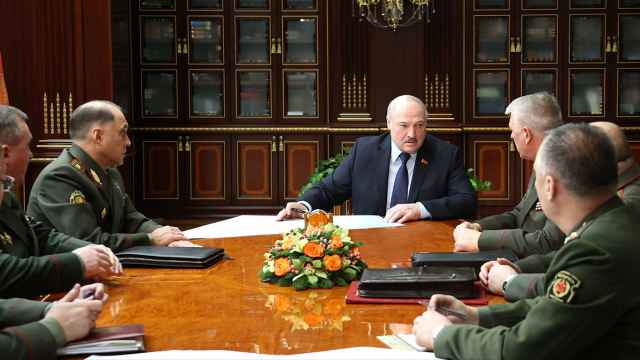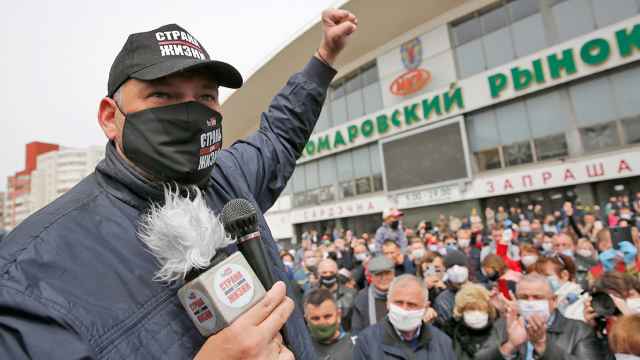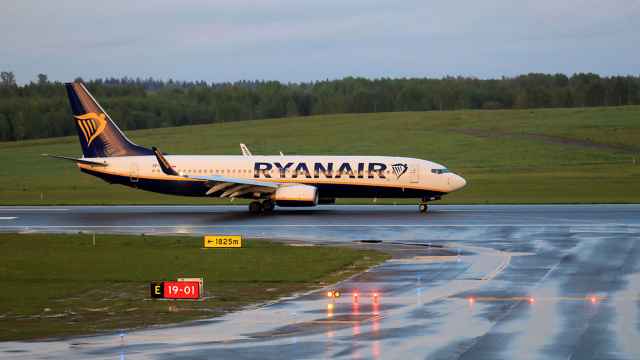Vladimir Putin has offered to help ensure Belarus's security, according to its president Alexander Lukashenko, as pressure builds on the strongman leader and opposition protesters prepare for a show of force Sunday.
Thousands demonstrated in the capital Minsk Saturday after main election challenger Svetlana Tikhanovskaya asked supporters to rally over the weekend and keep alive a movement that poses the biggest challenge to Lukashenko's hold over the ex-Soviet country.
Many gathered at the spot where Alexander Taraikovsky, 34, died on Monday during protests against an election the opposition says was rigged to give Lukashenko another term in office.
Demonstrators heaped flowers at the spot and the crowd chanted "Thank you!" and raised victory signs. Police kept a low profile.
Many held up photographs of protesters beaten during the crackdown, while one man stood in his underwear revealing the purple bruises on his thighs, buttocks and back.
Later thousands protested outside the Belarusian state television centre, complaining that their broadcasts backed Lukashenko and gave a skewed picture of the protests.
Around 100 staff came out of the building to join the crowd, and said they planned a strike on Monday.
"Like everyone we are demanding free elections and the release of those detained at mass protests," said one employee, Andrei Yaroshevich.
Riot police later arrived at the centre and blocked off the entrance to the building.
The opposition is planning a major show of force on Sunday with a "March for Freedom" through the streets of central Minsk.
'I'm really afraid'
Facing the biggest challenge to his rule since taking power in 1994, Lukashenko called in Moscow's help and spoke on the phone with Putin Saturday, after warning there was "a threat not only to Belarus."
He later told military chiefs that Putin had offered "comprehensive help" to "ensure the security of Belarus."
The Kremlin said the leaders agreed the "problems" in Belarus would be "resolved soon" and the countries' ties strengthened.
While Lukashenko periodically plays Moscow off against the neighbouring EU, Russia is Belarus's closest ally and the countries have formed a "union state" linking their economies and militaries.
Lukashenko criticized Russia during his election campaign and Belarus detained 33 Russians on suspicion of planning riots ahead of polls.
Opposition protesters slammed Lukashenko for now seeking Moscow's aid and said they fear Russian intervention.
"It's obvious that our president can't deal with his own people any more, he's seeking help in the east," said Alexei Linich, a 27-year-old programmer.
"If Russia intervenes, that would be the worst. I'm really afraid of this," said Olga Nesteruk, a landscape designer.
'Will not give up the country'
U.S. Secretary of State Mike Pompeo on Saturday urged Lukashenko to "engage with civil society," during a trip to Poland, which has offered to act as a mediator.
Tikhanovskaya, a 37-year-old political novice who ran after other opposition candidates including her husband were jailed, accuses Lukashenko of rigging the vote and has demanded he step down so new elections can be held.
The 65-year-old has ruled Belarus with an iron grip and claims to have won the election with 80% of the vote.
Tikhanovskaya left the country on Tuesday for neighbouring Lithuania, with her allies saying she came under official pressure.
She is also demanding authorities be held to account for the crackdown, which saw police use rubber bullets, stun grenades and, in at least one case, live rounds to disperse protesters, with at least 6,700 people detained and hundreds injured.
Officials have confirmed two deaths in the unrest, including Taraikovsky — who they say died when an explosive device went off in his hand during a protest — and another man who died in custody in the southeastern city of Gomel.
Call for 'free and fair' vote
On Friday authorities began releasing hundreds of those arrested and many gave horrific accounts of beatings and torture.
European Union ministers have agreed to draw up a list of targets in Belarus for a new round of sanctions in response to the post-election crackdown.
The leaders of the three ex-Soviet Baltic states — Estonia, Lithuania and Latvia — on Saturday condemned the crackdown and called for a new vote.
Lukashenko has dismissed the demonstrators as foreign-controlled "sheep" and "people with a criminal past who are now unemployed," repeatedly accusing foreign governments of plotting his downfall.
Tikhanovskaya on Friday announced the creation of a Coordination Council to ensure a transfer of power, asking foreign governments to "help us in organising a dialogue with Belarusian authorities."
She demanded the authorities release all detainees, remove security forces from the streets and open criminal cases against those who ordered the crackdown.
A Message from The Moscow Times:
Dear readers,
We are facing unprecedented challenges. Russia's Prosecutor General's Office has designated The Moscow Times as an "undesirable" organization, criminalizing our work and putting our staff at risk of prosecution. This follows our earlier unjust labeling as a "foreign agent."
These actions are direct attempts to silence independent journalism in Russia. The authorities claim our work "discredits the decisions of the Russian leadership." We see things differently: we strive to provide accurate, unbiased reporting on Russia.
We, the journalists of The Moscow Times, refuse to be silenced. But to continue our work, we need your help.
Your support, no matter how small, makes a world of difference. If you can, please support us monthly starting from just $2. It's quick to set up, and every contribution makes a significant impact.
By supporting The Moscow Times, you're defending open, independent journalism in the face of repression. Thank you for standing with us.
Remind me later.






